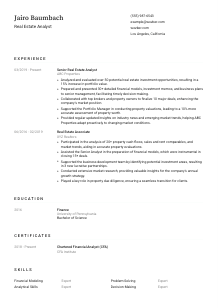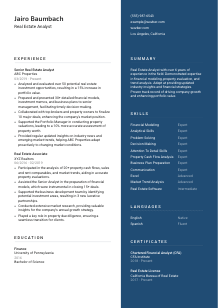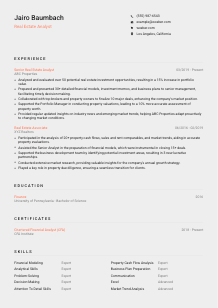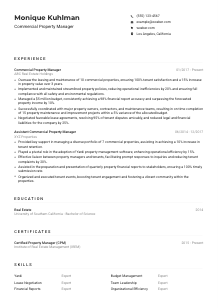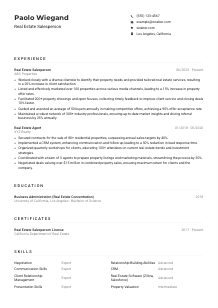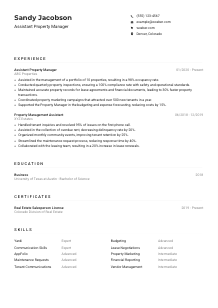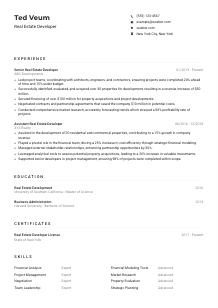Real Estate Analyst Resume Example
Playing with property numbers, but your resume isn't appreciating in value? Stake out this Real Estate Analyst resume example, charted with Wozber free resume builder. It showcases how you can line up your asset analysis skills with job specifications, so your career prospects are as prime as the parcels you evaluate!
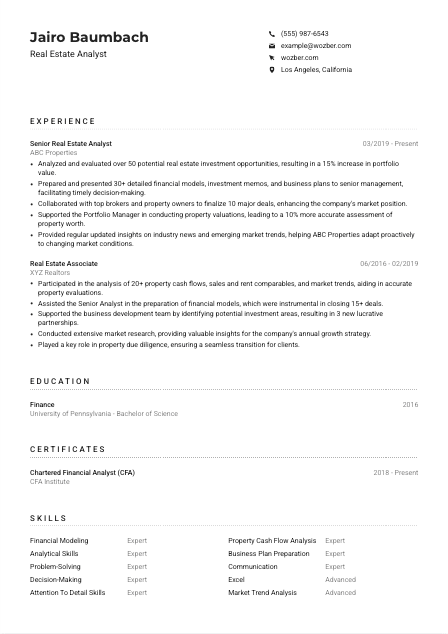
How to write a Real Estate Analyst Resume?
Aspiring Real Estate Analyst, listen up! In the fierce arena of job hunting, your resume is not just a piece of paper; it's your frontline advocate, echoing your prowess and expertise. Today, we're on a mission to craft a resume that not only meets but surpasses the expectations of your dream job. Leveraging the power of Wozber free resume builder, this walkthrough is your blueprint for constructing a resume that harmonizes with the exquisite details of a Real Estate Analyst's role.
Ready to transform your career narrative? Let's pave the way to showcasing your value in the real estate market!
Personal Details
The 'Personal Details' segment is your resume's opening gambit – it's where the first impression is anchored. Here's how to meticulously tailor this section for the Real Estate Analyst role, ensuring it speaks volumes about your professionalism and alignment with the job's geography and requirements.
1. Brand Yourself with Your Name
Your name is more than just a label; it's your professional identity. Make it memorable by choosing a crisp, clean font, and perhaps scaling up the size slightly for prominence. It symbolizes the headline of your career story.
2. Echo the Job Title
Positioning the job title conspicuously right under your name immediately signals your targeted role to the hiring manager. For a seamless match, mirror the language of the job description. In this case, 'Real Estate Analyst' becomes your banner.
3. Include Essential Contact Info
Ensure your contact information is bulletproof – a working phone number and a professional email address are non-negotiable. A misstep here could mean a missed opportunity. Remember, 'firstname.lastname@email.com' keeps it sleek and professional.
4. Location, Location, Location
Real estate thrives on geography, and so does your resume. Clearly stating 'Los Angeles, California' not only ticks off a job requirement but also connects your profile with local market knowledge – an invaluable asset in real estate analytics.
5. Digital Presence Matters
In the digital age, a LinkedIn profile or a personal website can significantly amplify your professional presence. Ensure it's aligned with your resume content, portraying a coherent professional image that resonates with potential employers.
Takeaway
Your initial introduction lays down the foundation of your professional persona. It's essential to keep it concise, relevant, and in alignment with the Real Estate Analyst role you aspire to. Consider this section as your business card embedded within your resume - it's your invitation for the hiring manager to dive deeper into your qualifications.





Experience
The Experience section is your resume's powerhouse, narrating your journey through the real estate market. How you've analyzed, collaborated, and impacted the industry comes to life here. Let's delve into aligning your experience with the golden nuggets of the job description.
- Analyzed and evaluated over 50 potential real estate investment opportunities, resulting in a 15% increase in portfolio value.
- Prepared and presented 30+ detailed financial models, investment memos, and business plans to senior management, facilitating timely decision‑making.
- Collaborated with top brokers and property owners to finalize 10 major deals, enhancing the company's market position.
- Supported the Portfolio Manager in conducting property valuations, leading to a 10% more accurate assessment of property worth.
- Provided regular updated insights on industry news and emerging market trends, helping ABC Properties adapt proactively to changing market conditions.
- Participated in the analysis of 20+ property cash flows, sales and rent comparables, and market trends, aiding in accurate property evaluations.
- Assisted the Senior Analyst in the preparation of financial models, which were instrumental in closing 15+ deals.
- Supported the business development team by identifying potential investment areas, resulting in 3 new lucrative partnerships.
- Conducted extensive market research, providing valuable insights for the company's annual growth strategy.
- Played a key role in property due diligence, ensuring a seamless transition for clients.
1. Dissect the Job Requirements
Start with a highlighter in hand, marking every keyword in the job description that aligns with your personal experience. For a Real Estate Analyst, words like 'analyze', 'evaluate', 'financial models', and 'market trends' should leap off the page.
2. Structure with Precision
Chronological layouts triumph by painting a story of growth. Begin with your latest role, detailing the company, position, and tenure. Remember, clarity here paves a smooth road for the hiring manager's understanding of your career trajectory.
3. Targeted Achievements Shine
For each role, curate bullet-points that reflect your achievements and responsibilities, specifically tailored to the Real Estate Analyst domain. Quantifying your success not only adds credibility but breathes life into your contributions, such as 'Enhanced portfolio value by 15% through meticulous investment evaluations.'
4. Quantify Where You Can
Numbers are the language of business. Infusing your accomplishments with quantifiable metrics offers a tangible measure of your impact. It's about showcasing your contribution through '10 major deals closed' or '30+ detailed financial models prepared.'
5. Relevance Is Key
While it's tempting to list every accomplishment, prioritize relevance over volume. Focus on experiences that directly resonate with the responsibilities and requirements of a Real Estate Analyst, ensuring every bullet point hits the mark.
Takeaway
As you sculpt the Experience section, imagine yourself in the shoes of the hiring manager, looking for reasons to choose you. Craft each statement as a testament to your qualifications, ensuring they're rich with industry-specific accomplishments. This section is your professional narrative – make it compelling and undeniable.
Education
In real estate analysis, your academic foundations can significantly influence your career trajectory. Here's how to elegantly sculpt your Education section, ensuring it aligns beautifully with the Real Estate Analyst role.
1. Highlight the Prerequisite
Dig into the job description to unearth key educational requirements. For the Real Estate Analyst role, a 'Bachelor's degree in Finance, Real Estate, or a related field' is our cornerstone. Ensure your education echoes this prerequisite.
2. Keep It Straightforward
This section thrives on clarity. List your degree, the field of study, and institution, followed by your graduation year. A straightforward layout allows these fundamental credentials to be easily digested by the hiring manager.
3. Align Your Degree
If your degree perfectly matches the job's educational requirement, highlight it prominently. For instance, 'Bachelor of Science in Finance' directly corresponds with the prerequisite, positioning you as a strong candidate from the get-go.
4. Relevant Courses Can Add Value
Though not always necessary, including pivotal courses can be a strategic move, especially for recent graduates. If your coursework includes advanced financial modeling or real estate market analysis, mentioning it can underscore your domain expertise.
5. Celebrate Additional Academic Achievements
Did you graduate with honors, or were you part of an academic club relevant to real estate? Highlighting these achievements can provide depth to your profile, showcasing a committed and engaged learning attitude.
Takeaway
Your education section isn't merely a list; it's a testament to your preparedness for the Real Estate Analyst role. Tailor this segment to reflect the job's requirements, and let it serve as a beacon of your dedication and capacity for the position.
Certificates
In the realm of real estate analysis, certain certifications can elevate your profile, showcasing your dedication to continuous learning and specific skill acquisition. Let's navigate how to highlight your certifications in alignment with the Real Estate Analyst role.
1. Extract Pertinent Job Requirements
Firstly, examine the job description for any mentions of required certifications. While our Real Estate Analyst position does not explicitly demand certifications, this doesn't mean they won't bolster your application.
2. Select Relevant Certifications
Focus on listing certifications that underscore your real estate analytical prowess, such as 'Chartered Financial Analyst (CFA)' or 'California Real Estate License.' These not only demonstrate your expertise but also your commitment to the field.
3. Don't Forget the Dates
If the certification has an expiration date or was recently obtained, note the dates to convey its currency and relevance. This detail ensures the hiring manager recognizes the freshness of your expertise.
4. Continuous Learning Is Key
The real estate market is ever-evolving, and so should your knowledge base. Regularly update your certifications and pursue new ones related to the ever-changing dynamics of real estate analysis. It's a testament to your adaptability and growth mindset.
Takeaway
Your certifications section is more than a list; it's a narrative of your dedication to excellence and professional evolvement. For a Real Estate Analyst, these 'badges' can be the difference-maker, amplifying your expertise and making your resume stand out.
Skills
The Skills section is a concentrated showcase of what you bring to the table. For a Real Estate Analyst, it's about blending analytical prowess with an intricate understanding of the market. Let's fine-tune this section to reflect the nuances of your expertise.
1. Gather Job-Specific Keywords
Kickstart this process by pinpointing both explicit and inferred skills from the job description. Skills like 'financial modeling', 'analytical skills', and 'Excel proficiency' are golden keywords for a Real Estate Analyst, linking directly to your professional weaponry.
2. Curate a List of Relevant Skills
Match the identified job-critical skills with your toolkit. This alignment portrays you as a tailor-made candidate for the role. Prioritizing skills that the job description emphasizes can significantly boost your resume's ATS compliance.
3. Maintain Focus and Clarity
Resist the temptation to inundate this section with every skill you possess. A strategized selection of skills pertinent to a Real Estate Analyst role maintains focus and ensures your resume remains impactful and digestible to hiring managers.
Takeaway
Approach your skills section as an arsenal of your most potent professional weapons, each chosen for its direct relevance and impact on the Real Estate Analyst role. Showcase them with pride, and remain committed to refining and expanding your skill set.
Languages
In an increasingly global market, linguistic capabilities can be a significant asset, offering a competitive edge. While our Real Estate Analyst role emphasizes English fluency, showcasing additional languages can underscore your versatility and global perspective.
1. Assess Language Requirements
Initially, evaluate the job description for any language preferences or requirements. In our case, 'English fluency' is imperative. Ensuring your resume reflects this proficiency is your first step to meeting the job's linguistic demands.
2. Prioritize Essential Languages
Highlight your proficiency in required languages at the top of this section, employing clear terms to define your level - ‘Native', ‘Fluent', etc. This clarity confirms to the hiring manager your capability in essential communication.
3. Showcase Additional Languages
Even if other languages aren't explicitly required, mentioning them can highlight your adaptability and readiness for diverse environments. This can be particularly advantageous for firms with a broad market reach or international dealings.
4. Be Honest About Your Proficiency
Accuracy in depicting your language skills is crucial. Misrepresentation can lead to awkward situations, especially if tested during the interview process. Honest self-assessment fosters trust and credibility with potential employers.
5. Understand the Scope of the Role
For roles that may entail analyzing markets beyond your local jurisdiction, fluency in additional languages can be a unique asset, offering insights and connections that monolingual peers might not access.
Takeaway
Embrace your linguistic skills as integral components of your professional identity, especially in roles like Real Estate Analyst, where understanding nuanced market communications can be invaluable. Let your resume reflect your global perspective and linguistic agility, readying you for opportunities locally and abroad.
Summary
The Summary section is your chance to distill your professional essence into a compelling narrative. It's all about striking the balance between brevity and impact, particularly for a Real Estate Analyst looking to differentiate themselves in a competitive field.
1. Capture the Job's Essence
Start by internalizing the job description, letting it guide the tone and content of your summary. It's about positioning yourself as a professional who not only meets but exceeds the expectations set forth by potential employers.
2. Begin with a Strong Introduction
Lead with a powerful statement that encapsulates your role and experience. Think of it as your headline, drawing the reader in with a clear declaration of your professional identity and expertise, especially in real estate analysis.
3. Address Major Job Requirements
Highlight pivotal skills and achievements that align with the role's demands. This isn't just about stating what you've done; it's about showcasing how what you've accomplished positions you as an ideal candidate for a Real Estate Analyst role.
4. Conciseness Is Key
While it's tempting to delve into details, the summary should encapsulate the essence of your professional story. Aim for a crisp narrative that invites the hiring manager to explore the depth of your resume further.
Takeaway
Consider your summary the hook that captivates the hiring manager's interest. Tailored closely to the Real Estate Analyst role, it's your initial pitch, succinct yet potent, offering a window into your professional caliber and potential. Let it intrigue, impress, and invite deeper exploration of you as a candidate.
Embarking On Your Real Estate Analyst Career Path
Kudos for sculpting a resume that speaks volumes of your potential in real estate analysis. This guide, powered by Wozber free resume builder, has equipped you with the knowledge to create an ATS-compliant resume that aligns with your career aspirations. Your resume is now a testament to your expertise, structured in an ATS-friendly resume format, and optimized through an ATS resume scanner for keyword alignment. As you prepare to submit your application, remember, your journey is unique, and this resume is but a chapter in your unfolding career story.
Step forward with confidence, knowing you're well-equipped to make your mark in the realm of Real Estate Analysis. The market awaits your insight and prowess. Go forth, analyze, and conquer!

- Bachelor's degree in Finance, Real Estate, or a related field.
- Minimum of 3 years of experience in real estate analysis or a similar role.
- Proficiency in financial modeling and Excel.
- Strong analytical, problem-solving, and attention to detail skills.
- Ability to effectively communicate complex financial information to both technical and non-technical stakeholders.
- English fluency essential for this role.
- Must be located in Los Angeles, California.
- Analyze and evaluate potential real estate investment opportunities including property cash flows, sales and rent comparables, and market trends.
- Prepare and present detailed financial models, investment memos, and business plans.
- Participate in due diligence and property tours, and collaborate with brokers, property owners, and other stakeholders.
- Support the Senior Analyst or Portfolio Manager in conduct property valuations and performance assessments.
- Stay updated on industry news, changes in local regulations, and emerging market trends to provide updated insights for decision-making.





